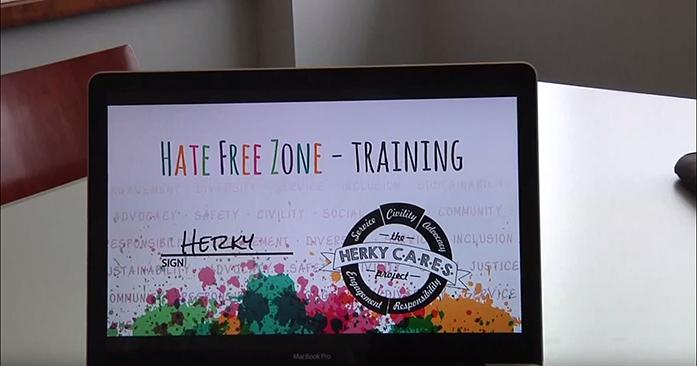By Anis Shakirah Mohd Muslimin
Education is the key to social justice issues, according to organizers for one new campus initiative.
Hate Free Zone Training is a new student measure by the University of Iowa’s Herky C.A.R.E.S. Project. Students can participate in optional training regarding social justice issues.
The project aims to educate students on the concepts of privilege, oppression, identity, and microaggressions, said Erin McFerrin, residence education coordinator at the UI Residence Education.
McFerrin is also the adviser for the Herky C.A.R.E.S. Project. C.A.R.E.S. stands for civility, advocacy, responsibility, engagement, and service.
She said the program also tries to help students develop the confidence to confront microaggressions when they encounter one and to make a pledge to mark residence-hall rooms as hate-free zones.
A microaggression is a subtle but offensive comment or action directed at a minority or other non-dominant group that often unintentionally or unconsciously reinforces a stereotype.
The group is a collaborative effort between student leaders and professional staff from across campus aiming to bring social justice, sustainability, and community responsibility experiences into the residence halls and the broader UI campus.
“Then we go into some intervention tips, like how can you actually combat those microaggressions when you see them — different techniques to intervene or to talk to somebody when you feel something” McFerrin said.
Tarun Kadaru, executive officer for social justice at Herky C.A.R.E.S, said the country has made a lot of improvements in combating social justice issues over the years, but he said he still believes a lot of progress has to be made.
“Having grown up in a minority race, I feel like the issues of discrimination, racism, sexism, etc., are really prevalent in today’s society,” he said.
Kadaru said being part of a social-justice organization has allowed him to make a change by helping students realize they can make the world a better place.
McFerrin and Kadaru worked together to create the Hate Free Zone training program.
The project conducted pilot training for RAs at Quad last week, and official training will begin next month.
Xiomara Santana, peer educator at Herky C.A.R.E.S, said the training is not meant to make people feel bad, but to make them more aware that what they say can really affect a person.
“I think a lot of times students are not aware of what they’re saying. They think it’s a joke,” she said. “By taking this course and knowing more about it, you’ll be more aware of what you’re saying.”
According to findings from Harvard University’s Voice of Diversity project, women and students of color continue to become the victims of psychologically damaging racism and sexism on college campuses.
Katelynn Davis, a resident assistant at Quad, said she personally learned a lot about the differences between microaggressions and biases.
“I feel like the best way to motivate people to stand up for something is to think about it in a more personal way,” she said. “Like prompting them to think about what it’s like if something like this happened to my sister.”
Davis even learned how to better approach situations that involved people who make insensitive remarks.
“I feel like every RA should know [through training] they can better understand people, because as a resident, you won’t have one type of student. You’re going to have a variety of them,” she said. “[RAs] need to know how to communicate with certain people, or how to reach out if there are people being targeted a certain way.”



